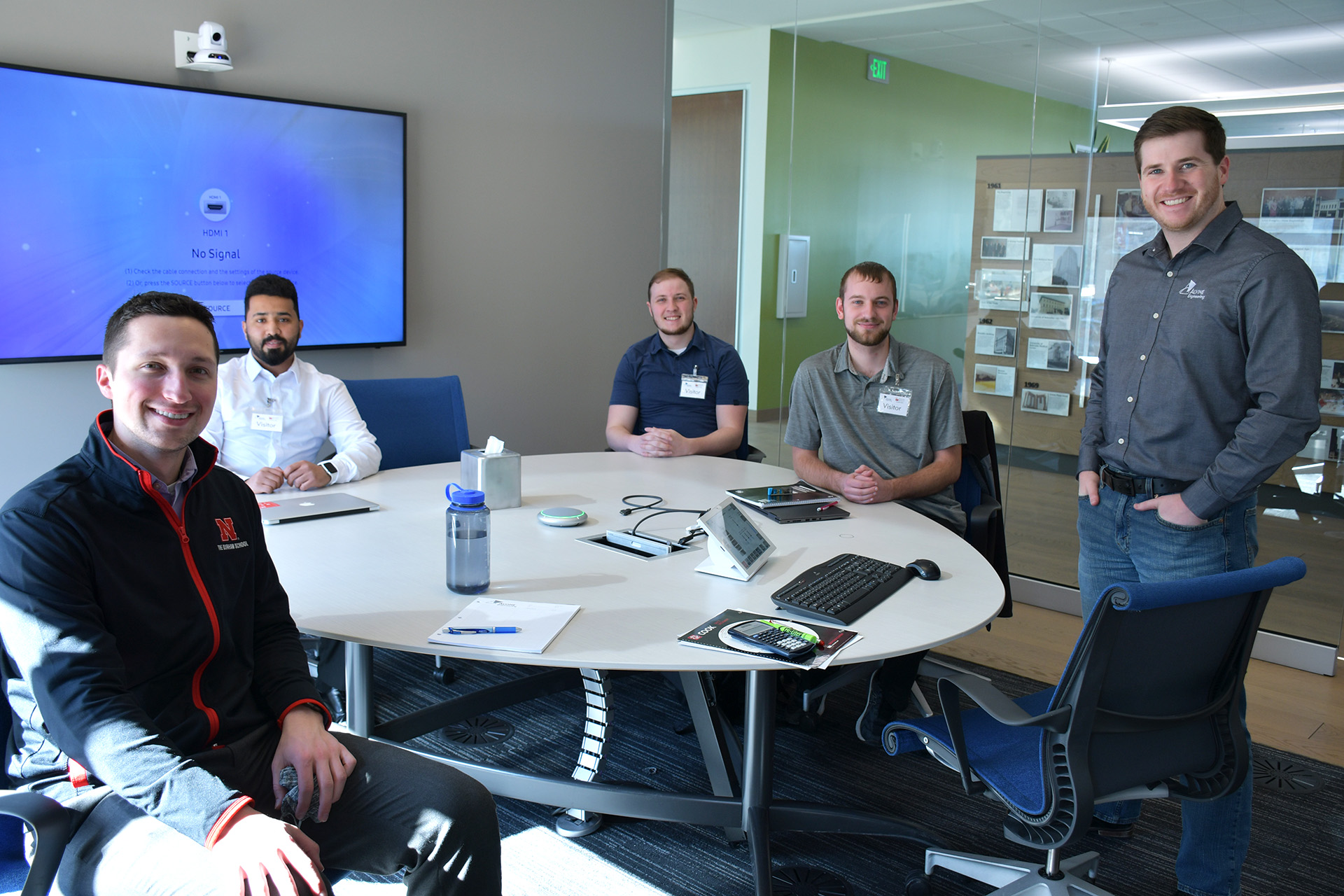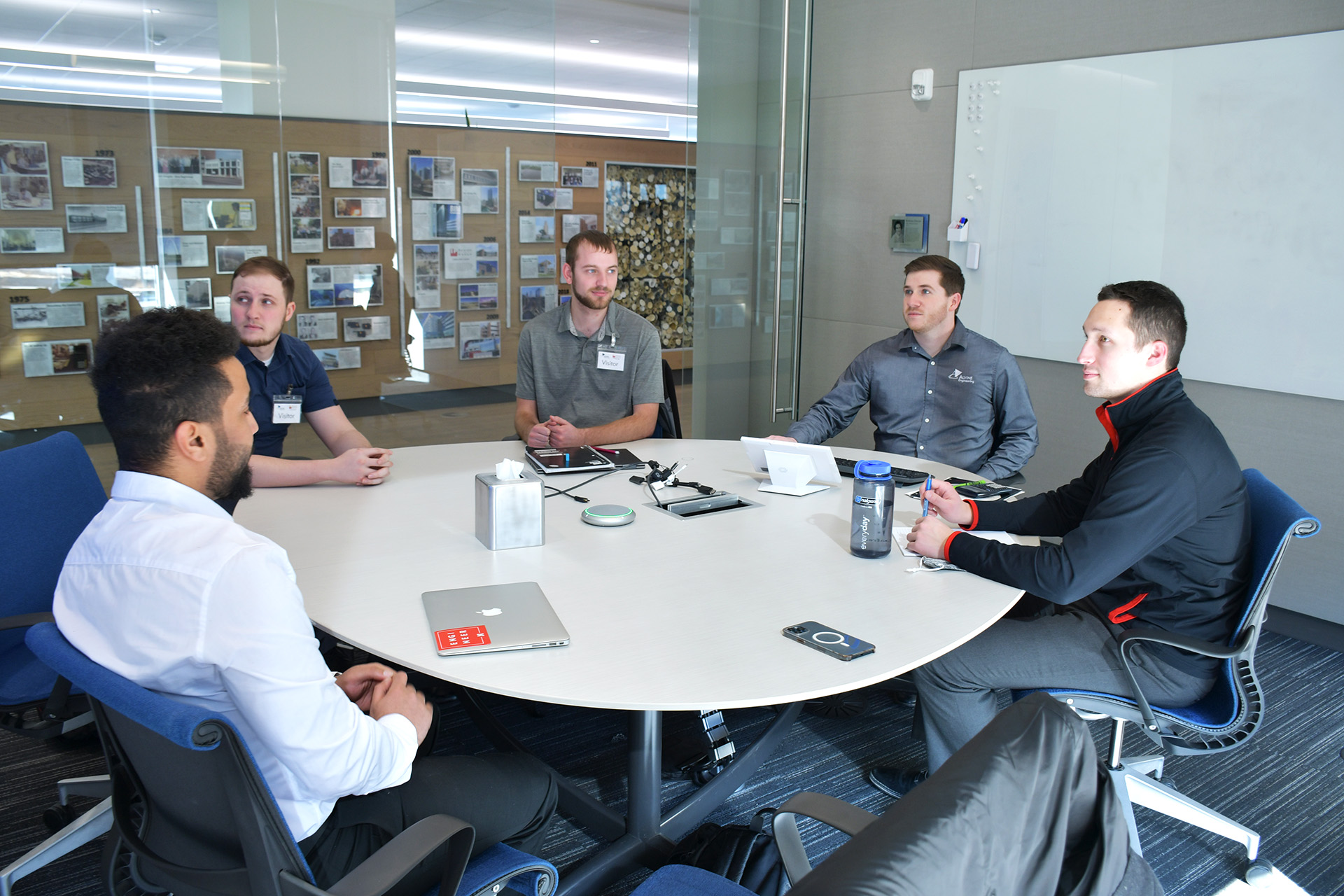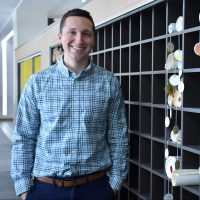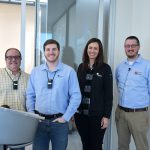Mentoring Tomorrow’s Engineering Professionals
Preparing to enter any industry is intimidating, especially as a student nearing graduation. For students at Peter Kiewit Institute (PKI) learning the ropes of the architecture, engineering, and construction (A/E/C) industry comes from a variety of experiences from classroom learning to group projects. Their capstone project sees the students put into teams and challenged to design the mechanical, electrical, plumbing, and structural systems of a building. The group then has to give a presentation that puts them in a situation similar to a request for proposals (RFP) interview that would take place on a real construction project.
This process can be overwhelming for those without prior experience, which is why PKI matches teams with industry professionals. Students can rely on mentors like Jacob Bullock and Nathan German to answer questions and provide guidance, not only on their projects, but on the ins and outs of the industry overall.

“We can further encourage positive connections between all disciplines by being a part of more student mentorship opportunities and making students aware of how decisions can affect all parties in the design and construction process.”
— Nathan German
You’ve been working as a young professional in the engineering industry for a few years now. What made you want to work with students again?
[Nathan German] I remember participating in the same student design project a few years ago. I know how valuable the team design project is to a student’s development and future career in the A/E/C industry. Being a part of that foundation made me want to be a mentor for the students.
[Jacob Bullock] I have always enjoyed working with students to pass along my knowledge to the next group of minds. Hopefully, my guidance will help them to better understand a skill, as well as help them avoid making the same mistakes that I did in the past. It is very fulfilling to see someone “get it” and start correctly applying what they have learned from me.
How have you seen the value added through mentorship?
[Jacob Bullock] Mentoring the PKI students is a particularly interesting task; these are masters level students in the engineering program. Truly, they are not that many years away from being where I am. They have most of the knowledge in their minds already. What I offer them is mindset and application.
The mindset portion is that, out in the professional field, it is you that must make decisions. Being confident in your solution and the physics behind it is what the professional industry is looking for. The application portion is teaching them what professional-level construction documents look like. How do we make things constructible off of a 30”x42” set of papers? What does a contractor need to see? Fully conveying the information of the design in your mind is a skill that all young engineers should focus on.
I have also learned a lot from the mentoring process. These intelligent students challenge me every time we meet by asking questions about complex systems and innovative solutions that don’t come up often in the professional industry. I have found myself learning alongside the students in some cases, trying to prove to myself that I am worthy of being a mentor.
[Nathan German] The students ask excellent questions. Sometimes, Jacob or I can answer it on the spot. Other times, we need to complete some research ourselves to be better informed when answering their questions. This has helped me grow to be more aware of other technologies within our industry. It has benefited the students by learning about various system types, how to design them, and knowing when to ask questions.

“Truly, they are not that many years away from being where I am. They have most of the knowledge in their minds already. What I offer them is mindset and application.”
— Jacob Bullock
How can we further encourage positive connections between architecture, engineering, and construction students and professionals?
[Nathan German] We can further encourage positive connections between all disciplines by being a part of more student mentorship opportunities and making students aware of how decisions can affect all parties in the design and construction process.
[Jacob Bullock] I think that the best way to further encourage positive connections between architecture, engineering, and construction students and professionals is to provide internships to younger students. I remember how it wasn’t until my senior year, when I got my first internship, that I actually understood what this profession was. I think that we should get younger students in front of the profession earlier to help them grow and be comfortable in the construction industry.

Jacob Bullock, a mechanical designer at Alvine Engineering, focuses on projects involving K-12 and higher education buildings, as well as many local Omaha projects. While usually smaller in scale, these projects provide Jacob with diverse opportunities and challenges. One of his favorite projects required overcoming unique challenges to create a photo kitchen for Omaha Steaks to film and photograph completed dishes for marketing materials.

Nathan German is a mechanical designer at Alvine Engineering. He often works on high-rise and multifamily/multitenant buildings. He enjoys being part of many large-scale projects in major cities across the country. Closer to home, he is proud to be a part of the project team for The Mercantile because of the scale and its impact on the Omaha skyline. Working on a major local project gives him a sense of pride in his hometown.



